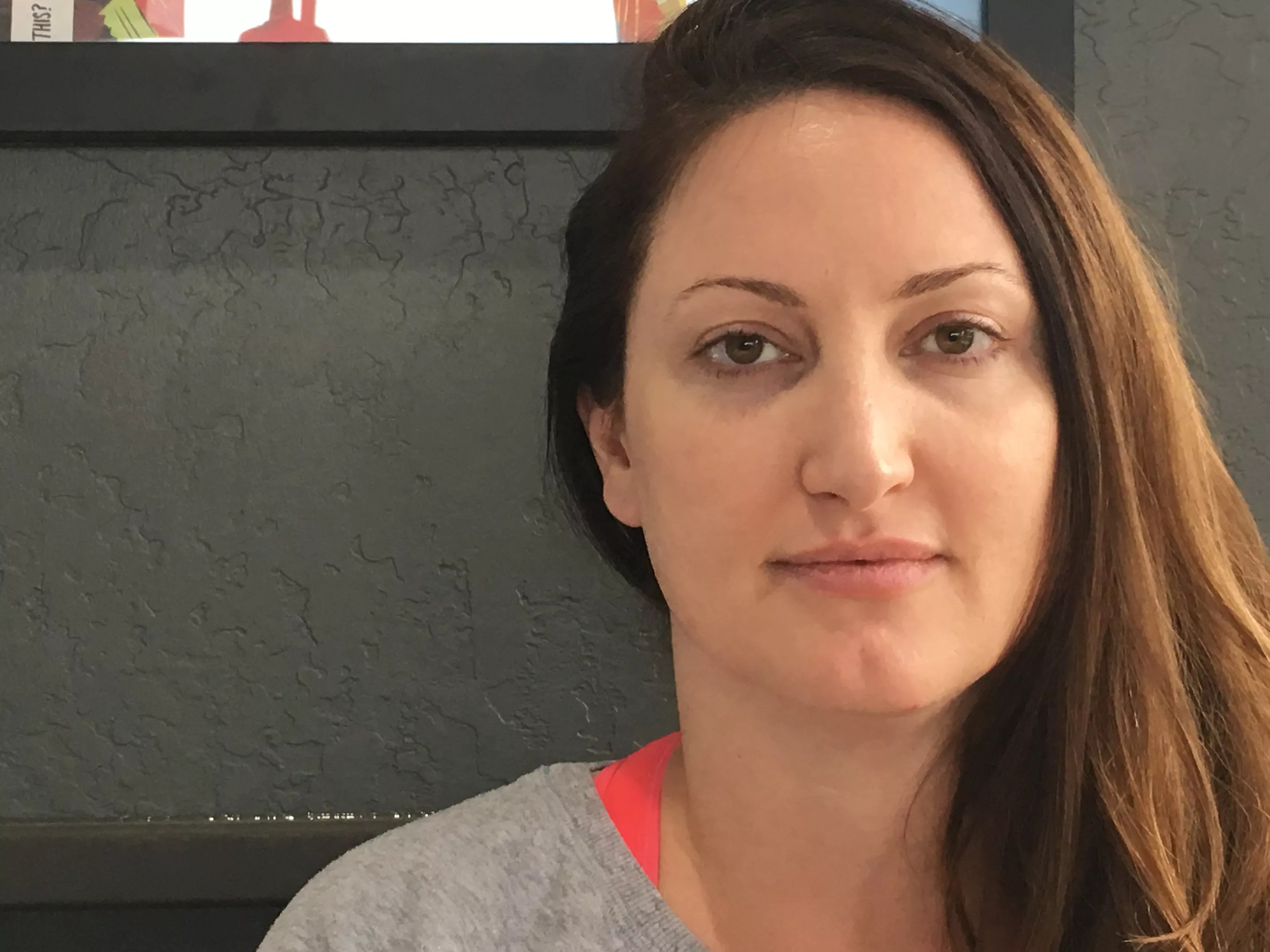
Ray Stern

Audio By Carbonatix
EDITOR’S NOTE: Some information in this story has been updated since publication.
Sometime between midnight and 1 a.m. on April 1, Geraldine Reyes heard her roommate, Brooke Lewis, bring a guy into the student-housing apartment they shared in Tempe.
The women both attended Arizona State University, but Lewis had just moved into the Vista del Sol apartment 10 days before. They didn’t know each other very well and Lewis, at 36, was much older. Reyes, in a statement she gave later to ASU investigators, said that listening to the way Lewis and the man called each other “hon” and “sweetie,” she supposed he might be her boyfriend.
Two very different versions exist as to what happened after that between Lewis and that man, an ASU graduate student named Matthew Green.
Lewis claims that Matthew Green roughed her up and raped her three times in her student-housing apartment after walking her home from a night of drinking at the Vine Tavern in Tempe. She’d never met him before that night.
Green told ASU officials that the sex, if there was any, was consensual. In his version of events, Lewis fell down and hurt herself because she was drunk, and he had to forcefully restrain her after she attacked him. In both accounts, Lewis was left covered in bruises.
As of mid-December, ASU police still considers the incident an open and active investigation.
“We do not recommend any conclusions at this time,” advised Katy Harris, ASU police spokeswoman.
Yet university administration has drawn some conclusions, affecting the lives of both Lewis and Green.
In August, the Dean of Students Office found that Green had probably committed sexual misconduct and physical harm against Lewis and that he should be expelled. But on November 20, the University Hearing Board voted 2-1 to recommend overturning the order.
“The majority believes that the sanction of expulsion is too severe,” the panel wrote in its recommendation, proposing instead a two-year suspension. Green “is a significant member of the ASU community. He carries a 3.9 grade point average and is considered an essential member of one of ASU’s research teams.”
Lewis was outraged at the recommendation – and remains angry over how ASU has treated her in general since the incident.
As of today, one of her concerns has been answered: Green’s expulsion was upheld by James Rund, senior vice president for Educational Outreach and Student Services.
The expulsion was announced after Phoenix New Times began asking questions about the case.
In his expulsion letter to Green, dated today, December 13, Rund wrote that he concurs with the board’s findings regarding the alleged violations. But he added:
“I do not accept the board majority’s rationale for a modification in sanction nor do I accept their recommended alternative sanction,” Rund wrote. “As a graduate student and member of the university community you are aware of the conditions necessary to provide an optimal environment for learning… Violations of the student code of conduct that threaten these conditions, such as sexual misconduct, are among the most serious and warrant a commensurate response.”
A copy of the letter was sent to Lewis (see below).
But Lewis remains upset that Rund agreed with the board that Green didn’t cause her physical harm.
“Oh, my God, what a piece of shit,” she said on Wednesday after ASU emailed her Rund’s decision. “How on earth can you rape someone and not cause physical harm?”
Green, who did not return messages for this article, has 15 days to request another hearing, and could also appeal Rund’s decision in Superior Court.
Reyes could not be reached for comment, but her account of the incident as collected by the ASU Dean of Students office, and provided to New Times by Lewis, offers several corroborating details.
The pair was being loud, but Reyes said she soon fell asleep in her own room. She remembered waking up to loud banging sounds coming from Lewis’ bedroom, which was right next to hers. She heard Lewis telling Green to “get out,” and heard him say, “What’s wrong, sweetie?”
“How are you going to explain all these bruises?” Reyes heard Lewis say.
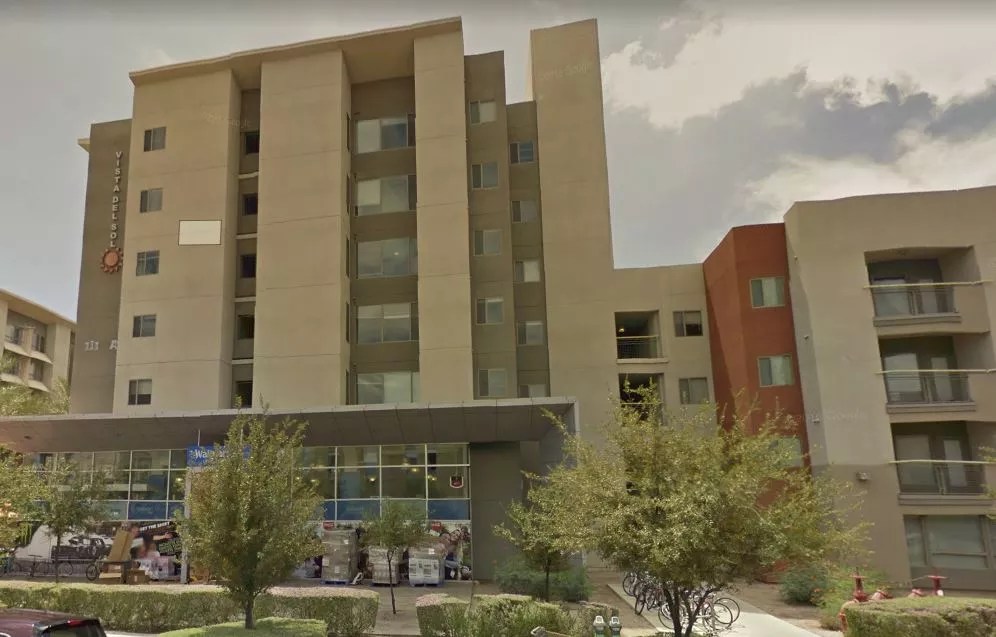
Vista del Sol student housing apartments on Apache Boulevard in Tempe.
“What do you mean?” the man replied. “I would never hurt you.”
“Get out, get out!” Lewis yelled.
Reyes heard more banging and “hitting” sounds on the wall between the bedrooms, and she overheard Lewis say, “Give me back my phone.”
Reyes got out of bed and opened her door. She could see Green from the side in the doorway of the apartment, clothed and apparently on his way out. Lewis was standing in the small kitchen “buck naked.” Reyes saw Green deposit Lewis’ phone on the kitchen counter.
“Go back to your room,” Lewis called to her. Reyes went back inside her room. A few seconds later, Lewis was knocking for her.
“I don’t know what to do,” Lewis told her roommate. “I just got raped.”
Exactly what happened inside Lewis’ room, only Lewis and Green know.
The hearing board’s decision last month in support of keeping Green at ASU gained Lewis a number of supporters.
A Change.org petition to “Expel rapist permanently, not 2 years,” now has more than 8,000 online signatures. Earlier this month, as a Facebook video shows, Lewis and several members of the group Sun Devils Against Sexual Assault delivered a stack of the online petition signatures to Rund’s office, demanding that the university expel Green.
Lewis said she’s due to graduate in spring 2018 with a degree in Interdisciplinary Studies in Business and Family and Human Development – not that she could enjoy it anymore. She describes how she’s encountered lies and incompetence at nearly every turn, from the paramedics who responded to her the night of the rape to the police who are investigating it, and from victims’ advocates to ASU administrators. A month after she reported the crime, the university sent her notice that her financial aid was being revoked. Officials say it was a coincidence. She claims it’s retaliation.
“This is ridiculous. I can’t tell you how many times my head has exploded,” she said. “I’m never going to hang my degree on the wall and be proud of it.”
Not content with the role of victim, she’s decided to take the offensive: She’s filed a Title IX complaint with the U.S. Education Department’s Office for Civil Rights, alleging the university:
• Did not respond equitably or promptly to the sexual assault complaint because of her sex.
• Discriminated against her because of her disability – she said she has suffered from post-traumatic stress disorder for years.
• Discriminated against her because of her age by failing to respond to her complaints about harassment by her roommate, Reyes.
• Retaliated with the scholarship problem and with the allegedly poor response to her wide-ranging complaints.
Sandra Roesti, supervisory general attorney with the OCR, wrote her back on October 27 to say that “we intend to conduct a prompt investigation of this complaint.”
Lewis threatens that she might file a civil lawsuit against ASU.
She’s also taking her issue to the news media. The online women’s activist and entertainment site Babe.net published an article about Lewis last month that was picked up by the left-wing DailyKos and a few other sites.
Lewis met recently with New Times for this article and provided extensive documentation on the university’s investigation, including email exchanges with school officials and police, investigation summaries from the Students Rights and Responsibilities and Dean of Students office, related documents like a statement provided by Green to the university that tells his side of the story.
Lewis wants to break stereotypes of rape victims and said she has no problem being named and photographed for this or other articles.
“I’ve done nothing wrong and we shouldn’t feel embarrassed or ashamed to say ‘I was raped,'” she said.
The large amount of alcohol that Lewis drank on March 31 at the Vine Tavern was a factor in what happened, everyone involved seems to agree. Lewis admits she’d never been more drunk.
She was feeling pretty good that day after getting three job offers, she said in an interview with New Times. She decided to celebrate by going out for drinks at the Vine, a venerable and popular bar at 801 East Apache Boulevard. Arriving at 5 or 6 p.m., she stayed for hours drinking and chit-chatting with several “nice” people, including a woman she had just met. She had at least four beers and two glasses of Everclear-fueled “apple juice” before Green showed up.
“Can I sit here?” he asked, moving aside the purse of the woman Lewis knew, who had left the chair to visit with other friends.
Lewis never got his name, but did get his age, 27, and the information that one side of his family was Spanish. He was “much shorter” and she wasn’t attracted to him, but she enjoyed his “intellectual” banter. He was “sipping on a beer,” but she also paid for a “couple rounds of Jaegermeister” for both of them. She would later tell ASU officials she was “almost black-out drunk.”
Seeing how drunk Lewis was, Green offered to walk her to nearby Vista del Sol, saying he “lived on campus,” she said. She doesn’t remember inviting him in – “he just pushes his way in” to the apartment when they got there, she said.
They had more drinks inside the apartment. Then he said he wanted to show her a YouTube video, so they headed to her room to get on her computer.
Once inside the room, he ripped off her shirt and bra, she told New Times. They hadn’t kissed before this, she said.
“I was like, ‘slow it down, take it easy, dude,'” she said.
He shoved her and she slammed her head into a wall, Lewis said. He pulled her jeans off roughly, leaving scrapes, then he grabbed her by the neck, bent her over a laundry hamper, and penetrated her from behind, she said. She tried to fight back and soon lost consciousness.
When she came to, “I was completely naked on the floor. He’s on top of me, raping me,” she said, adding that’s when she yelled, “Get out, get out!”
They fought some more, and he raped her again from behind, she said.
She managed to fight him off and grabbed her phone to try and call 911. He took it from her and put it in his pocket.
Finally, she said, he put on some clothes, laced up his boots slowly, and walked out of the room, where Reyes saw him with Lewis chasing him while naked. He’d been in her room about an hour total, Lewis said.
Green opened the front door to leave and Lewis threw his backpack outside, she said. She told him he still had her phone and he threw it on the ground.
Lewis told Reyes he had “legitimately raped” her.
“What? That’s not your boyfriend” Reyes asked her.
Lewis threw on a pair of jeans and a top and ran outside to find him. She also called 911. When she called isn’t quite clear – Reyes said police didn’t show up for about 90 minutes after the incident.
Matthew Green is a graduate student in engineering at ASU. He grew up in Phoenix and at the time of the incident, lived in student housing at ASU’s Polytechnic campus in east Mesa, about 20 miles from ASU’s main campus in Tempe.
Green did not respond to multiple requests for comment for this article, nor did his local attorney, Dana Hogle, who represented him in last month’s expulsion appeal. Green’s story of what happened on March 31 can be gleaned from summaries of the university investigation and a letter dated April 10 that he composed and later submitted to ASU.
As he wrote in the letter, he got to the Vine at about 6 p.m. to work on a school paper and have some beer. He left for a couple of hours to attend a “salsa class” outside of a Tempe campus engineering building, then went back to the Vine, had more beer, and played darts. At 11:30 p.m. or so, he closed his laptop and strolled up to the bar, where he noticed Lewis glancing at him.
“We talked for a couple hours,” he wrote. He bought them each a shot of Jaeger, and she bought herself three more Jaeger shots after that, Green wrote. They left the bar at about 1 a.m. and “walked arm in arm back to her room.”
He took a drink she offered and went into her room, where she took a hit off a marijuana vaporizer, according to Green. He declined her offer to share a vape with her. Soon they were “making out.”
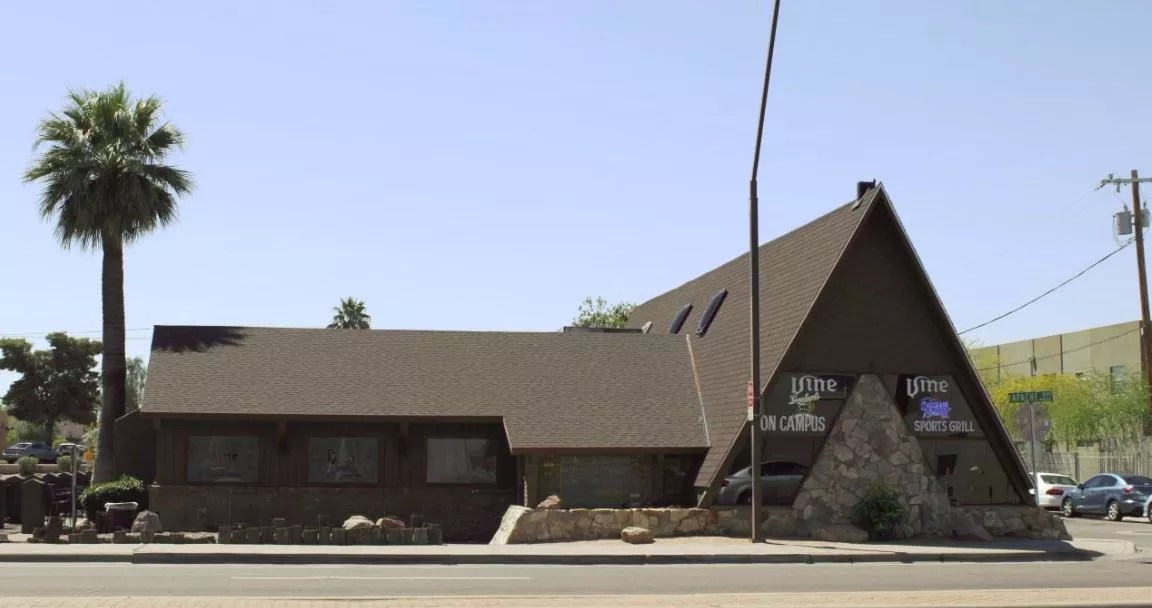
The Vine Tavern in Tempe
Google Maps
“Clothes started coming off,” he wrote. “I turned her around and with my right hand on her shoulder, bent her over the bed. She muttered something only partially audible, to the effect of, ‘Wow, this is moving fast.’ … She said something which I couldn’t quite ascertain.”
He couldn’t tell if he had penetrated her. He heard her say, “‘…you’re not going to stop?’ at which I dropped back and asked ‘Stop? You want me to stop?'” he wrote. He later claimed to ASU officials that “his hearing is bad.”
That’s when things got “weird,” he told investigators.
“Just lay on the bed and be happy to get you [sic] dick sucked,” he recalled her saying.
He sat on the bed and noticed that she was retrieving her mobile phone. She stepped back to him with the phone and “acted like she still wanted to fool around…” he wrote in his statement.
“I approached her again and tried to re-initiate fooling around, as she still had her clothes off,” he wrote. As she walked toward him, she suddenly tripped and fell, hitting the wall with her head “pretty hard.”
She got up and tried to take pictures of him while he had his pants down, so he snatched her phone away, he wrote. She attacked him and bit his face, latching onto his cheek with her teeth, so the former high-school wrestler applied “pressure points behind her ears, which causes considerable pain,” according to Green.
Lewis let go of his cheek, but she kept trying to bite him, Green reported. He put a hand on her forehead “but she twisted her head while chomping her jaws trying to bite my hand and wrist,” he wrote. “At this point I had to get off to the side of her and placed my hand on the back of her neck and held her head down to the carpet with her knees still underneath her.”
When he let her up she “charged at me again,” and he left the room. Reyes came out of her room and Lewis, who Green said had put on some clothes, also emerged and yelled that he had raped her. He recalled telling Reyes that it wasn’t true, and that Lewis “is not in her right mind”
He realized he still had her phone on him, and he put it on the counter before leaving the apartment. He called Lyft for a ride home, then remembered that he left his backpack in the apartment. The apartment door suddenly opened and Lewis threw his backpack at him. He “hoped that she would come to her right sense in the morning after sobering up,” he wrote.
On the 22-mile trip to the Polytechnic campus, Green claims, he told the Lyft driver about his encounter with Lewis. He also remembered waking up the next day with “the indentation of at least 4 tooth marks” on his face. He didn’t take a photograph of the injury, though, “and it was mostly faded by the following day.”
Five days later, on Thursday, ASU police had figured out from interviews and video surveillance cameras at the Vine, and met with Green at the Polytechnic campus, where he worked.
Green admitted to police that he met Lewis at the bar and took her back to her room “where they began to have consensual sex,” according to an email to Mike Mader, senior associate dean of students at Polytechnic campus from ASU police Commander Christopher Speranza. “He stated, he vaginally penetrated her from behind for a very short time … Green stated that the victim asked him to stop, which he did.”
Per ASU policy, Green was placed on “administrative hold” on May 12, and “trespassed from the Tempe campus” before either side’s story could be evaluated.
The investigation by ASU’s Students Rights and Responsibilities (SRR) office, which the Dean of Students office based its conclusions, found more inconsistencies with Lewis’ story than Green’s.
SRR officials noted that Lewis described two versions of the alleged attack. In the first, she said Green did a “Jekyll and Hyde flip” after they went into her room, shoving her into wall before raping her.
In the second version, officials noted, Lewis said he pushed her into a wall, “but it was not hard,” and then tried to take her shirt off. She said “whoa” several times and that she was too drunk to have sex, she told SRR officials in an interview, and recalled saying, “You know, I kinda like you… and maybe I would give you a blowjob.”
Green said no to her offer, “and then the sexual violence started,” an SRR summary of Lewis’ version states.

Nicole Taylor, Dean of Students, Tempe
Arizona State University
In his separate interview with SRR, Green told officials that after she tripped and fell, “he tried to re-engage.” But then she accused of him continuing to try to have sex with her, which she didn’t want.
He reportedly told Lewis at that point, “If you didn’t want to have sex why’d you invite me back to your place?”
He denied pushing her into a wall at any point, and reiterated to officials that he didn’t think he penetrated her. But he also told them “he put his hand on her left shoulder and bent her over; he may have been too rough; apologized to her if he was too rough (did not mean to be),” the SRR report states.
Green’s account of putting her phone on the kitchen counter was corroborated by Reyes.
Lewis was “openly displeased” with the administrative review process and “refused follow up meetings with investigators and others involved in the case,” according to a review of the investigation by deans of students Nicole Taylor, Lance Harrop, and Kendra Hunter, Sr.
ASU police told university officials that they would not divulge the results of a rape-kit test performed on Lewis the morning after the alleged attack. With no empirical evidence of rape to judge, officials considered the credibility of both sides. Lewis’ story was deemed “plausible.” Also, she had no “reason to lie.” But inconsistencies in her statements were weighed along with “the many instances” in which Lewis claimed that officials were making “false or exaggerated” statements.
Green, on the other hand, also had a “plausible” story. But officials were concerned about the deep bruise on Lewis’ back after the incident, which “did not seem consistent with someone who simply fell against a wall,” according the statement by Taylor and the others.
Yet even if Green’s statements were taken as true, he still violated ASU’s misconduct code by engaging in sexual activity with someone who was “incapacitated and could not give consent,” they wrote.
Based on the “more likely than not” standard, the reviewers found that Green had committed sexual misconduct and caused physical harm to Lewis. On July 31, they sent Green an email that he was being expelled.
Green appealed the decision immediately, leading to a hearing on November 17 overseen by the three-member University Hearing Board. The board consisted of chair Craig Allen, the associate dean of Barrett Honors College, Melissa Samuelson, a clinical assistant professor at the W. P. Carey School of Accountancy, and student representative Jose Rodriguez. Several other ASU officials attended the hearing, as well.
Green and his lawyer were there.
Lewis, who had unsuccessfully attempted to get Craig Allen removed as chair of the panel for the hearing, attended as a witness “but did not put on a case.” She told New Times she felt that Allen had “obvious bias in favor of the rapist.”

Craig Allen, associate dean of Barrett Honors College
Arizona State University
Allen and the two other hearing board members decided they could safely ignore Reyes’ testimony, since she had not been privy to what happened in Lewis’ bedroom. Although the accounts of Green and Lewis conflicted, “regardless of its nature, both parties concur that sexual activity did take place,” the panel found.
The three panel members pointed out that at the hearing, Green himself admitted that Lewis had been “extremely intoxicated” and fell from a “drunken stumble.” He also referred to “erratic behavior” by Lewis that indicated she was incapacitated. Green tried to make the case that Lewis only became incapacitated from the booze and marijuana after what he described as a failed attempt at sex. The panel concluded that Lewis was almost certainly incapacitated from the time she left the Vine and through the entire episode with Green.
The Arizona Board of Regents’ Student Code of Conduct states that “consent may never be given by a person who is incapacitated by drugs (or) alcohol.”
The panel voted 3-0 that Green committed sexual misconduct. But the panel also found 3-0 it was not more likely than not that Green committed physical harm to Lewis.
“The board did not find the photograph [of the bruise on Lewis’ back] sufficient” to back up the charge, the panel wrote.
Rund, in his December 13 letter to Green, indicated that he agreed with that finding.
When paramedics arrived the morning of April 1, they noted that Lewis had no sign of injuries. Lewis said they never looked at her legs or back.
Lewis describes this as the beginning of her second nightmare: the terrible response to her complaints by ASU.
“It’s not incompetence – it’s a cover-up,” Lewis told New Times.
When ASU officials talked to her, she said, they told her falsely that her contact information was correct when it wasn’t.
Officials told her at first that her attacker wasn’t a student and closed her case. (They reopened it the same day, records show.)
They told her she’d be able to listen to the audio recording she made of her own testimony, but then later said she couldn’t hear it unless she signed a nondisclosure agreement. They released her full name and email address to Green against her wishes, then let him listen to her “unredacted” testimony, which included private medical information, she said.

James Rund, ASU senior vice president for Educational Outreach and Student Services
Arizona State University
Officials failed to tell her immediately when Green filed his appeal, causing her to lose time to prepare for the November hearing, she said. She added that her assigned victim’s advocate, Lynn Spillers, told her she was not allowed to say anything that might make ASU look bad, causing her to distrust Spillers. These are just some of Lewis’ complaints about the process.
The most dire problem came on Saturday, May 13, when the dean of Admission and Financial Aid Services, Melissa Pizzo, sent her an email stating that she had failed to meet ASU academic standards. In particular, her “pace rate,” which measured how many courses she had passed in her major compared to how many courses she had attempted, had fallen to 52 percent, making her ineligible to receive financial aid. Lewis said that was a mistake, and there was no legitimate reason to mess with her financial aid.
She gets scholarships through the ASU Disability Resource Center because of her PTSD, she told New Times. Asked what triggered the PTSD, Lewis related that her parents were abusive to her and her stepbrother. She declined to detail the abuse.
After Lewis complained that the scholarship revocation seemed like retaliation, ASU freed up the funds. She now has enough aid to complete her degree program by the end of the spring semester, she said.
ASU declined to comment specifically on Lewis’ complaints or the investigation.
Jasmine Lester, a former ASU student who founded Sun Devils Against Sexual Assault in 2013, said she’s not surprised by Lewis’ complaints about ASU’s investigative process.
“The way ASU is treating Brooke Lewis is not an uncommon experience for sexual violence victims at ASU, where rapists are more likely to be charged with sexual assault they commit off campus than on campus,” Lester said. “Administrators make the reporting process so stressful that a lot of victims give up on the investigation process altogether and leave school.”
She referred to a September article by the university’s student-run State Press news site, which found that ASU charged 62 cases of sexual misconduct out of a total of 3,660 cases of any kind reported to SRR in the 2015-2016 school year.
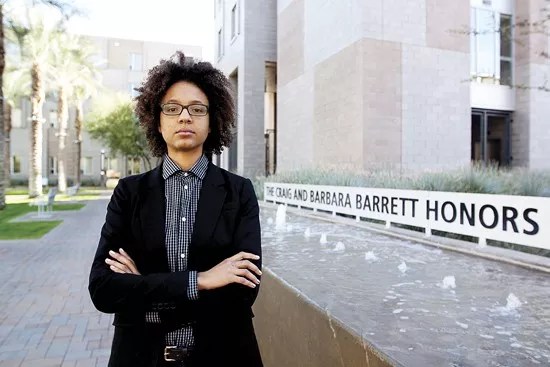
Jasmine Lester, founder of Sun Devils Against Sexual Assault
Evie Carpenter / Phoenix New Times
Lester added that she experienced some of these “tactics” when she reported a Barrett Honors College professor who sexually harassed and stalked her. New Times reported in a January 2015 article about inappropriate relationships between Barrett professors and students that Lester founded SDASA after ASU found that her professor had not committed any policy violations.
A follow-up article in October 2015 about ASU sexual-misconduct allegations mentioned that the university had only just hired a Title IX coordinator who would oversee federal regulation on such claims. The story noted that in some ways, ASU had been dealing proactively with complaints about how it handled sex allegations.
Former ASU spokesman Mark Johnson told New Times back then that “we take vigorous action when offenses are reported,” and that new students are now required to complete an online course on sexual-violence awareness that includes discussions of consent and respect.
A Title IX tracker web site published by the Chronicle of Higher Education shows that ASU has three open Title IX investigations dating back to 2012.
Lewis’ case shows that ASU could learn a few more things about how to best handle complaints like hers. What’s unclear is to what extent ASU officials tried to cause Lewis more harm, whether they had good intentions that somehow got skewed, which actions may have been misperceived by Lewis.
For now, Lewis must still wait to find out whether Green will appeal Rund’s December 13 decision, how the appeal will go, and what will happen when police conclude their investigation, which may lead to charges against Green and a possible trial. The alleged rape happened eight months ago, but the problems it caused are not over for Lewis, or Green.
Lewis has been having “panic attacks” in classes that have hurt her grades, she said. She’s lost two jobs, but is currently employed as a waitress. She said she’s been having nightmares.
She’s gotten support from a non-university counselor she found through her health care network, and from her friends. Lester and SDASA “is helping me get through it – they’ve saved my life at this point.”
A few weeks ago, Lewis’ bike was stripped of its components while parked at ASU, leaving it a useless wreck.
She got an email from ASU officials last week: They were giving her a brand-new bike – was she okay with yellow?
But Lewis’ anger won’t be bought off with by the present. She plans to move forward with her official complaints and, possibly, a lawsuit – even if Green is expelled.
“They need to be called out on this, because this is their pattern,” she said. “They bulldoze rape victims. That’s what they do.”
Below: James Rund Expulsion Letter
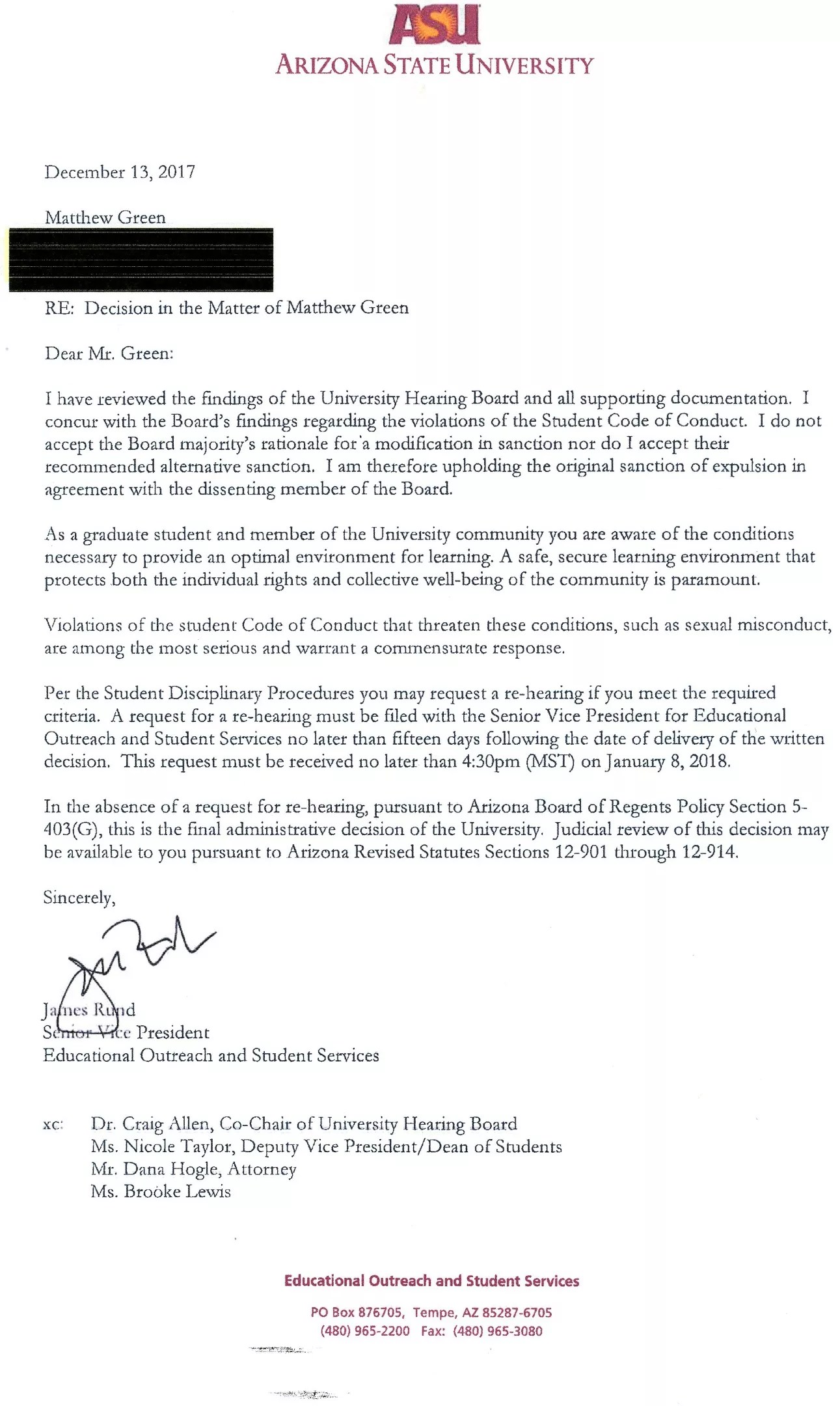
ASU